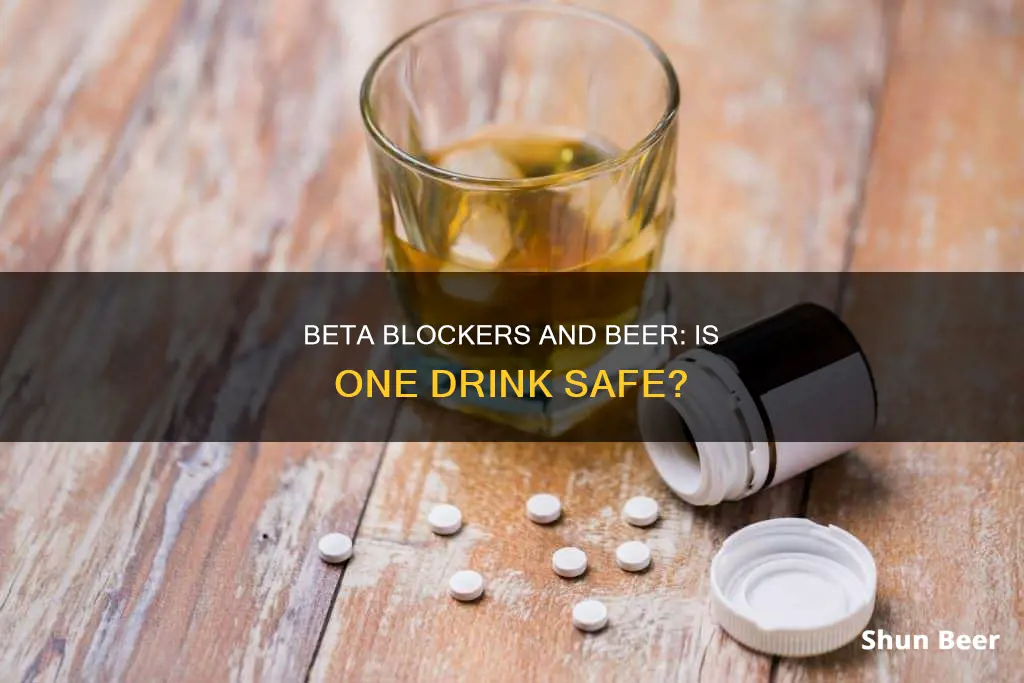
Beta-blockers are a class of drugs used to treat cardiovascular diseases, including hypertension, myocardial infarction, and congestive heart failure. They work by slowing down the heart rate and reducing the force of each beat, which lowers blood pressure. Alcohol also has the effect of lowering blood pressure. Therefore, drinking alcohol while taking beta-blockers is generally not recommended by doctors as it can cause an individual's blood pressure to drop too low, leading to side effects such as dizziness, nausea, and fainting. However, a single drink of alcohol with a beta-blocker is not likely to cause serious side effects, especially in people who tolerate beta-blockers well.
| Characteristics | Values |
|---|---|
| Is it safe to drink 1 beer while on beta-blockers? | Drinking alcohol while taking beta-blockers is generally not recommended by doctors. |
| Why? | Beta-blockers and alcohol can both lower your blood pressure, so the combination can cause it to dip too low, resulting in a condition called hypotension. |
| What are the risks? | Side effects include dizziness, nausea, fainting, and inability to concentrate. There is also a risk of more severe problems, such as heart rhythm issues and falls. |
| What should I do if I want to drink while taking beta-blockers? | Discuss with your doctor, who will be able to advise on whether drinking is safe for you and how much you can drink. |
What You'll Learn

Beta-blockers and alcohol may cause hypotension
Beta-blockers are commonly prescribed for heart-related issues, including high blood pressure, congestive heart failure, irregular heartbeat, and the prevention of heart attacks. They work by blocking the effects of epinephrine, which slows the heart rate and reduces the force of each heartbeat, thereby lowering blood pressure.
Alcohol can also lower blood pressure, and when combined with beta-blockers, the resulting hypotension can be dangerous. Additionally, alcohol can negatively impact the conditions that beta-blockers are used to treat, such as heart conditions, migraines, anxiety, and glaucoma.
While a single drink of alcohol with a beta-blocker is unlikely to cause serious side effects, it is generally recommended to avoid alcohol consumption while taking beta-blockers. The safety of mixing alcohol and beta-blockers depends on various factors, including medical history, age, and other medications. It is essential to consult a doctor to discuss the risks and benefits and explore alternative options.
Drinking Alcohol While Taking Systemic Enzymes: What You Need Know
You may want to see also

Beta-blockers and alcohol may cause dizziness and nausea
Beta-blockers and alcohol do not make a good mix. Both substances have similar effects on the body, and when taken together, they can cause dizziness, nausea, and fainting.
Beta-blockers are prescribed to treat various heart conditions, including congestive heart failure, high blood pressure, irregular heartbeat, and postural tachycardia syndrome. They work by blocking the effects of the hormone epinephrine (also known as adrenaline), which slows down the heart rate and reduces the force of each heartbeat, thereby lowering blood pressure.
Alcohol also has the effect of lowering blood pressure. So, when beta-blockers and alcohol are mixed, there is a risk of hypotension, or low blood pressure. This can lead to dangerous symptoms such as dizziness, nausea, and fainting.
The effects of mixing beta-blockers and alcohol depend on several factors, including the specific beta-blocker, the amount of alcohol consumed, and the individual's medical condition. In some cases, alcohol can make beta-blockers less effective or increase the risk of side effects. For example, alcohol can cause the body to absorb an extended-release formula of beta-blockers more quickly, increasing the risk of side effects.
Therefore, it is generally not recommended to drink alcohol while taking beta-blockers. If you wish to continue drinking, it is important to consult your doctor to weigh the risks and explore alternative treatment options.
Beer and Meclizine: Safe Mix or Health Risk?
You may want to see also

Beta-blockers are typically prescribed for cardiovascular diseases
Beta-blockers are a class of drugs primarily used to treat cardiovascular diseases and other conditions. They work by blocking the effects of stress hormones such as adrenaline on the heart. Beta-blockers are often prescribed for irregular heartbeats, high blood pressure, and after heart attacks. They are also used to treat tachycardia, hypertension, myocardial infarction, congestive heart failure, cardiac arrhythmias, coronary artery disease, hyperthyroidism, essential tremor, aortic dissection, portal hypertension, glaucoma, and migraine prophylaxis.
Beta-blockers are typically administered orally, intravenously, or ophthalmically, and the route of administration depends on the acuity and type of illness, as well as the chronicity of the disease. For example, beta-blockers are used topically for glaucoma and intravenously for arrhythmias. Outpatient prescriptions often involve once-a-day dosing for longer-acting beta-blockers, while most beta-blockers are dosed at least twice per day.
Beta-blockers enhance the heart's ability to relax, causing it to beat slower and less forcefully, which helps reduce blood pressure and alleviate irregular heart rhythms. They also relax blood vessels through vasodilation, improving blood flow and reducing the heart's workload. This makes beta-blockers particularly useful for treating angina, or chest pain.
While beta-blockers are effective in treating cardiovascular diseases, it is important to note that they can have side effects. Some common side effects include fatigue, dizziness, nausea, and constipation. Less commonly, beta-blockers can cause bronchospasm, especially in asthmatic patients. Additionally, beta-blockers can induce hyperglycemia and mask hemodynamic signs of hypoglycemia, so they are not usually recommended for people with diabetes.
It is crucial to consult a doctor before taking beta-blockers, especially if you have a history of alcohol use or plan to consume alcohol while on this medication. Alcohol can change how beta-blockers work and may increase the risk of side effects. In some cases, individuals may need to quit drinking or consult a cardiologist to weigh the risks and benefits.
Beer and Bactrim: Is It Safe to Drink Alcohol?
You may want to see also

Alcohol may decrease the effectiveness of beta-blockers
Alcohol consumption can cause an individual's blood pressure to fluctuate, spiking and then ultimately lowering. This can be dangerous for people taking beta-blockers, as the combination can cause a person's blood pressure to dip too low, resulting in a condition called hypotension. This can lead to symptoms such as dizziness, nausea, and fainting.
Additionally, alcohol may increase the risk of certain beta-blocker side effects, particularly when it causes the body to absorb an extended-release formula more quickly. For example, in a study of metoprolol, researchers found that the drug was released into the body much faster when taken with 40% alcohol compared to 5% alcohol. This suggests that potent drinks may alter how the drug works in the body.
Furthermore, alcohol can have negative effects on the conditions that beta-blockers are used to treat, such as heart conditions, migraines, anxiety, and glaucoma. Excessive drinking can lead to high blood pressure, heart rhythm issues, and chronic health issues like high cholesterol, which increase the risk of heart disease.
Therefore, it is generally recommended that individuals taking beta-blockers avoid alcohol consumption or drink only in moderation after consulting with a doctor.
Beer and Ulcerative Colitis: What's the Verdict?
You may want to see also

Beta-blockers and alcohol may cause a fast heart rate
Beta-blockers are a class of medicines used to treat heart and circulatory conditions, including chest pain, coronary artery disease, heart failure, high blood pressure, and irregular heart rate. They work by blocking the effects of adrenaline, slowing nerve impulses, and reducing the force of the heartbeat, which lowers blood pressure.
Alcohol can also lower your blood pressure, so when combined with beta-blockers, there is a risk of hypotension, or dangerously low blood pressure. This can cause dizziness, nausea, and fainting. In addition, alcohol can negatively impact the conditions that beta-blockers are prescribed to treat, such as heart conditions, migraines, tremors, anxiety, and glaucoma.
While a single drink of alcohol with a beta-blocker is not likely to cause serious side effects, it is generally not recommended by doctors to mix the two. This is because the effects depend on the specific beta-blocker, the amount of alcohol consumed, and the medical condition being treated. For example, alcohol can cause the extended-release form of metoprolol to be released into the body faster, increasing the risk of side effects.
Furthermore, beta-blockers may be appropriate for some people who drink, but only under the supervision of a doctor. People who wish to continue drinking while taking beta-blockers should discuss the risks and benefits with their doctor and explore alternative options.
Beer and Naproxen: Is It Safe to Mix?
You may want to see also
Frequently asked questions
It is not recommended to drink alcohol while taking beta-blockers. Beta-blockers lower blood pressure and heart rate, and when combined with alcohol, there is a risk of blood pressure dropping to dangerously low levels, a condition called hypotension.
Side effects of drinking alcohol while on beta-blockers include dizziness, nausea, fainting, and inability to concentrate.
Beta-blockers are prescribed for a range of conditions, including heart problems, migraines, anxiety, and glaucoma.
It is recommended to wait for at least 2-3 days after starting beta-blockers or changing dosage before drinking alcohol, to see how the medication affects your body.
If you experience any side effects from mixing alcohol and beta-blockers, you should consult a doctor immediately. However, do not stop taking beta-blockers without first consulting a medical professional, as suddenly stopping can lead to life-threatening issues.







